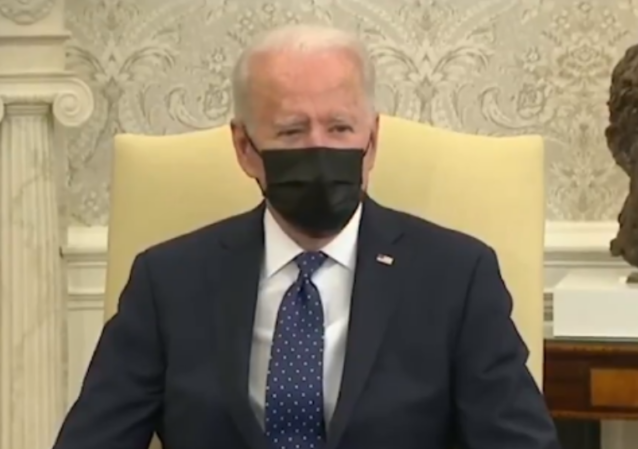Appeals Court Enjoins Biden’s Coronvirus Relief Favoring Non-Whites and Women

The Biden administration, at several levels, has implemented racial preferences that have led to litigation involving farmers and others excluded because their skin does not have enough color in it.
The 6th Circuit Court of Appeals just issued and injunction halting racial and gender discrimination in the Coronavirus Relief package that recently passed Congress. The issue was not the relief package itself, but racial and gender preferences used by the Small Business Administration to favor non-whites and women.
Here are excerpts from the Opinion:
This case is about whether the government can allocate limited coronavirus relief funds based on the race and sex of the applicants. We hold that it cannot. Thus, we enjoin the government from using these unconstitutional criteria when processing Antonio Vitolo’s application.
The Opinion goes into the details of the law at issue:
As part of the most recent coronavirus relief bill (the American Rescue Plan Act of 2021), Congress allocated nearly $29 billion for grants to help restaurant owners meet payroll and other expenses. Pub. L. No. 117-2, § 5003(b)(2)(A), (c) (Restaurant Revitalization Fund). The fund was created to aid small privately owned restaurants, not large chains. Id. § 5003(a)(4)(C). The Small Business Administration, a federal agency, processes the applications and distributes the funds….The key to getting a grant is to get in the queue before the money runs out. The Small Business Administration distributes money on a first come, first served basis. But there is a catch. During the first 21 days the agency gives grants to priority applicants only. Id. § 5003(c)(1). Priority applicants are restaurants that are at least 51% owned and controlled by women, veterans, or the “socially and economically disadvantaged.”….Antonio Vitolo and his wife own a restaurant called Jake’s Bar and Grill. Vitolo is white and his wife is Hispanic, and they each own 50% of the restaurant. Like many restaurants, Jake’s Bar has struggled during the pandemic—it closed on weekdays and offered to-go orders on weekends. It lost workers and a considerable amount in sales. So on the first day that the Small Business Administration allowed applications, Vitolo submitted one. Since the restaurant is not 51% owned by a woman or veteran, Vitolo had to qualify as “socially and economically disadvantaged” to get priority status….The Small Business Administration has injected explicit racial and ethnic preferences into the priority process. See 13 C.F.R. § 124.103. Under a regulation that predates the pandemic, the agency presumes certain applicants are socially disadvantaged based solely on their race or ethnicity. Groups that presumptively qualify as socially disadvantaged—and thus get to jump to the front of the line for priority consideration—include “Black Americans,” “Hispanic Americans,” “Asian Pacific Americans,” “Native Americans,” and “Subcontinent Asian Americans.”1 Id. § 124.103(b)(1). If you are in one of these groups, the Small Business Administration assumes you qualify as socially disadvantaged. Indeed, the only way not to qualify is if someone comes forward “with credible evidence to the contrary.” Id. § 124.103(b)(3).Applicants who do not get the presumption must prove they have experienced racial or ethnic discrimination or cultural bias by a preponderance of the evidence. …The added evidentiary burden faced by white men and other non-presumptively disadvantaged groups stands in marked contrast with lenient evidentiary standards set by the American Rescue Plan Act….Vitolo sued to end the race and sex preferences in grant funding, claiming that they violated his constitutional rights. With the funds rapidly depleting, Vitolo asked for a temporary restraining order and ultimately a preliminary injunction that would prohibit the government from handing out grants based on the applicants’ race or sex. The district court declined to issue a restraining order and said that Vitolo was unlikely to succeed on the merits of his claim.
The Court rejected the administration’s claim that the discrimination was lawful:
Vitolo challenges the Small Business Administration’s use of race and sex preferences when distributing Restaurant Revitalization Funds. The government concedes that it uses race and sex to prioritize applications, but it contends that its policy is still constitutional. We disagree….When the government promulgates race-based policies, it must operate with a scalpel. And its cuts must be informed by data that suggest intentional discrimination. The broad statistical disparities cited by the government are not nearly enough….For these reasons, we conclude that the government lacks a compelling interest in awarding Restaurant Revitalization Funds based on the race of the applicants. And as a result, the policy’s use of race violates equal protection….The government contends that women “struggled to receive pandemic relief from the Federal government” from prior aid programs. Gov’t Resp. 20 (citation omitted). But as we previously discussed, the government has a ready alternative: Give priority to restaurant owners who did not receive prior aid. There is no need to use sex as a proxy when the government seeks to remedy a problem that is purely economic….Thus, the government has failed to provide an exceedingly persuasive justification that would allow the classification to stand….It has been twenty-five years since the Supreme Court struck down the race-conscious policies in Adarand. And it has been nearly twenty years since the Supreme Court struck down the racial preferences in Gratz. As today’s case shows once again, the “way to stop discrimination on the basis of race is to stop discriminating on the basis of race.” Parents Involved, 551 U.S. at 748 (plurality opinion).The government shall fund the plaintiffs’ grant application, if approved, before all later-filed applications, without regard to processing time or the applicants’ race or sex. The government, however, may continue to give veteran-owned restaurants priority in accordance with the law. This preliminary injunction shall remain in place until this case is resolved on the merits and all appeals are exhausted.
CLICK HERE FOR FULL VERSION OF THIS STORY